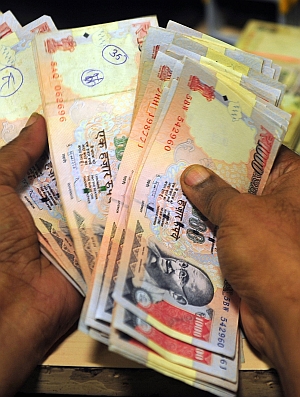 BLACK MONEY Our Verdict: What the BJP manifesto promised: The NDA government will initiate the process of tracking down and bringing back black money stashed in foreign banks and offshore accounts. We will set up a Task Force for this purpose and recommend amendments to existing laws or enact new laws. We will also proactively engage with foreign governments to facilitate information sharing on black money. A Year Later: On May 27, 2014,a Special Investigation Team was set up with former Supreme Court judge Justice M B Shah as chairman. But "no out of the box idea" emerged in the SIT's deliberations to get black money back to India. Read more...
This year, Finance Minister Arun Jaitley told Parliament that the governments of Switzerland, the United Kingdom and Spain had not provided details of any black money accounts. Poll: Has Modi delivered on black money? |
 KASHMIRI PANDITS Our Verdict: What the BJP manifesto promised: The return of Kashmiri Pandits to the land of their ancestors with full dignity, security and assured livelihood will figure high on the BJP's agenda. A Year Later: In the Budget for 2015-16, the Centre earmarked Rs 580 crore for the rehabilitation of about 62,000 registered Kashmiri refugee families in the country, who have moved from the Valley to Jammu, Delhi and other parts of the country after the state was rocked by militancy in 1989. The government though rejected the Kashmiri Pandits' demand for dedicated townships or exclusive zones. Read more...
The refugees feel that the Centre is merely talking about their return, but is unwilling to discuss the issue with them. Poll: Has Modi delivered on Kashmiri Pandits? |
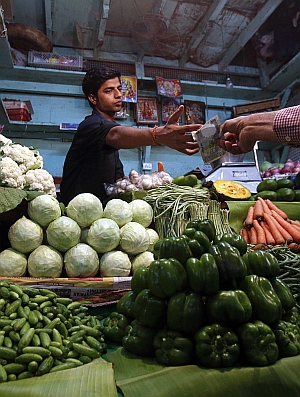 INFLATION Our Verdict: What the BJP manifesto promised: Rein in inflation; through consistent, long-term policies, we will not just spur the process of economic growth, but also ensure that it is stable as well as balanced; end policy and decision paralysis; restore confidence in the integrity of the decision-making and sanctity of our decisions. A Year On: The key indicator of the country's economic health, the gross domestic product, grew by 7.5 per cent in 2014-15 compared to the 6.9 per cent growth recorded in the previous financial year. Although it is an advance estimate, the final is likely to be slightly less than that, but unlikely to fall below the growth rate in 2013-14, taking into account the World Bank's estimate. Read more...
Growth in consumer price inflation, or retail inflation -- an indicator of consumption expenses -- has eased in the last one year to 5.17 per cent in March. It is now well within the Reserve Bank of India's target of maintaining 6 per cent retail inflation until January 2016. Poll: Has Modi delivered on reining in inflation? |
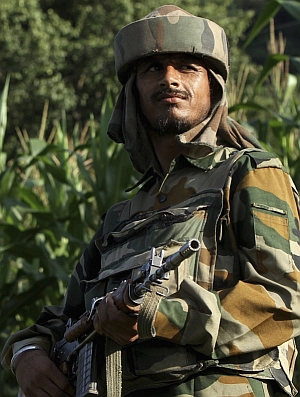 ARTICLE 370 Our Verdict: What the BJP manifesto promised: Will discuss Article 370 with all stakeholders and remain committed to its abrogation. A Year Later: In less than 48 hours of the Modi government's swearing-in ceremony last May, Jitender Singh Rana, a first-time Lok Sabha MP from Jammu’s Udhampur, and a junior minister in the Prime Minister's Office, had stirred up a political controversy by suggesting that a debate would soon start on Article 370 of the Constitution to determine the "special status" of Jammu and Kashmir. "We are speaking to the stakeholders. Article 370 has done more harm than good," the minister had told a TV channel. Read more...
But, earlier this year, following an impressive performance in the Jammu and Kashmir assembly elections and the government-formation tussle with the PDP, the BJP did a U-tun on its stance by agreeing to maintain the state's constitutional status and keeping Article 370 untouched. Poll: Has Modi delivered on Article 370? |
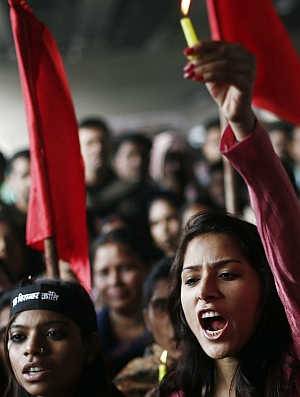 WOMEN'S EMPOWERMENT & SAFETY Our Verdict: What the BJP manifesto promised: Launching a national campaign for saving the girl child and educating her -- Beti Bachao, Beti Padhao; strict implementation of laws related to women, particularly those related to rape; transform the quality of life of women in rural India by providing electricity, tapped water, cleaner fuel and toilets in every home A Year Later: The government amended the Central Civil Services (Conduct) Rules, 1964, to expand the definition of sexual harassment as well as that of a 'workplace'. Specifying the circumstances which may be construed as sexual harassment, the government said that any implied or explicit promise of preferential employment or any such threat of detrimental employment or her present employment status may amount to sexual harassment of a woman government employee. Read more...
In January, Modi launched the twin programmes of "Beti bachao, beti padhao" and "Sukanya Samriddhi account" in a bid to encourage the birth and education of girls and to tackle the abysmally low child sex ratio of 918 girls for 1000 boys. Poll: Has Modi delivered on women's empowerment & safety? |
 GOVERNANCE Our Verdict: What the BJP manifesto promised: Minimising the discretion in the citizen-government interface; end governance deficit and encourage the bureaucracy to take right decisions; making people active drivers of development rather than mere passive recipients; implement 'Sabka Saath, Sabka Vikas'; implement Minimum Government, Maximum Governance. A Year Later: Soon after taking over, Modi went on an overdrive by restructuring ministries, with 17 of them clubbed into seven organic ministries. But over the next few months, Modi's style of functioning started getting a fair share of scrutiny. Read more...
The government has been accused of over-centralisation of authority, with all important files needing the PM's sign-off. A report in Outlook magazine mentioned that 6000 files were pending with the PMO, up from 1500 during Prime Minister Manmohan Singh's time.
Poll: Has Modi delivered on governance? |
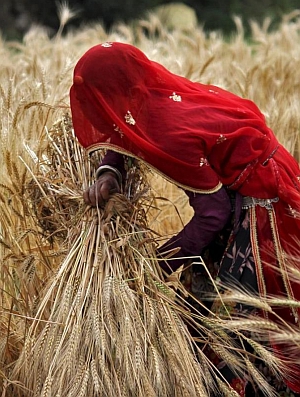 MINUMUM SUPPORT PRICES FOR FARMERS Our Verdict: What the BJP manifesto promised: Steps to ensure a minimum of 50 per cent hike in Minimum Support Price over the cost of production of agricultural products; implementation of the recommendations of National Commission on Farmers headed by M S Swaminathan and the National Agricultural Policy; recommended MSP for 22 agricultural commodities and fair and remunerative prices for sugarcane. A Year Later: MSP is price fixed by government to protect farmers against excessive fall in price during bumper production years. The MSP is a guaranteed price for their produce from the government. Read more...
Going against its election promise, the Modi government has told the Supreme Court that it would not be possible to increase the MSP on pulses, food grains, oilseeds and major vegetables by 50 per cent, as such an increase would have an adverse impact on the market. Poll: Has Modi delivered on safeguarding farmers' interests? |
 CLEAN GANGA Our Verdict: What the BJP manifesto promised: To ensure the cleanliness, purity and uninterrupted flow of the river Ganga. In addition, a massive 'Clean Rivers Programme' would be launched across the country driven by people’s participation A year later: It is Modi's pet project. A separate Ganga ministry was created under water resources ministry to prioritise the river cleaning work and at the helm is Uma Bharti. The NDA government launched 'Namami Gange' last year and has devised a three-phase plan costing nearly Rs 51,000 crore spanning 18 years to clean the river. The short-term plan includes stopping open nallahs from discharging into the river, restriction of industrial and chemical discharge into the river among others. Read more...
The centre has announced an immediate Rs 20,000 crore funding in the budget for 'Namami Gange' programme to clean the river over the next five years, a four-fold increase over the money spent in the last three decades for the river's conservation. The government is focusing on involving people living on the banks of the river to attain sustainable results, marking a major shift in implementation. Poll: Has Modi delivered on cleaning Ganga?r |
 LAND ACQUISITION Our Verdict: What the BJP manifesto promised: Land acquisition is a contentious issue due to the opacity of the land acquisition process. The BJP will adopt a 'National Land Use Policy', which will look at the scientific acquisition of non-cultivable land, and its development; protect the interest of farmers and keep in mind the food production goals and economic goals of the country. Its implementation would be monitored by the National Land Use Authority, which will work with the State Land Use authorities to regulate and facilitate land management. A Year Later: The Land Acquisition Act was passed during the previous UPA regime which the BJP supported while in the opposition. Read more...
The original act provides for "fair compensation" for acquiring farm land for industrial projects. However, states and corporate have been demanding a relaxation in the law as, they argue, it has made acquisition very difficult and has hurt the process of acquiring land for infrastructure projects. Poll: Has Modi delivered on land acquisition? |